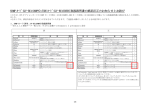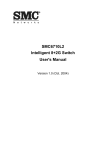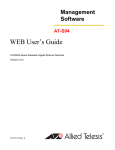Download AlliedView™-EMS 3.10 AMIGO USERS GUIDE
Transcript
AlliedView™-EMS 3.10 (Full Installation) AMIGO USER’S GUIDE AlliedView™-EMS 3.10 AMIGO USERS GUIDE Page 1 of 43 TABLE OF CONTENTS 1 OVERVIEW........................................................................................................................................ 4 2 STARTING AMIGO .......................................................................................................................... 5 2.1 STARTING FROM THE COMMAND LINE .............................................................................................6 2.1.1 Command Syntax............................................................................................................6 2.1.2 Target Host......................................................................................................................7 2.1.3 SNMP Version..................................................................................................................7 2.1.4 Get Community...............................................................................................................8 2.1.5 Set Community ...............................................................................................................8 2.1.6 User Account Name .......................................................................................................8 2.1.7 Security Level ..................................................................................................................8 2.1.8 Authentication Protocol .................................................................................................9 2.1.9 Authentication Password................................................................................................9 2.1.10 Privacy Protocol ............................................................................................................9 2.1.11 Privacy Password.........................................................................................................10 2.1.12 Configuration File........................................................................................................10 2.1.13 Parameter File .............................................................................................................10 2.2 CONFIGURING AMIGO ..................................................................................................................12 2.3 STARTING FROM DEVICE MANAGER ...............................................................................................13 3 MAIN WINDOW ............................................................................................................................ 14 3.1 MIB TREE PANEL ............................................................................................................................15 3.1.1 General MIB Tree..........................................................................................................15 3.1.2 Personal MIB Tree.........................................................................................................15 3.1.3 Target Device ................................................................................................................16 3.2 DETAILED INFORMATION PANEL ....................................................................................................18 3.3 MIB OPERATION PANEL .................................................................................................................19 3.3.1 Checkbox Column.........................................................................................................19 3.3.2 MIB Variable Column....................................................................................................20 3.3.3 MIB Value Column ........................................................................................................20 3.3.4 Select All Button ...........................................................................................................20 3.3.5 Clear Button ..................................................................................................................20 3.3.6 Reverse Button ..............................................................................................................20 3.3.7 Get MIB Value Button ..................................................................................................20 3.3.8 Set MIB Value Button ...................................................................................................20 4 MENUS............................................................................................................................................. 22 4.1 FILE .................................................................................................................................................23 4.1.1 New File..........................................................................................................................23 4.1.2 Open................................................................................................................................23 4.1.3 Save .................................................................................................................................23 4.1.4 Save As ...........................................................................................................................23 4.1.5 Target Device ................................................................................................................23 4.1.6 Property..........................................................................................................................23 4.1.7 Exit ..................................................................................................................................35 4.2 EDIT ................................................................................................................................................36 4.2.1 Cut...................................................................................................................................36 4.2.2 Copy ................................................................................................................................36 4.2.3 Paste................................................................................................................................36 4.2.4 Delete..............................................................................................................................36 4.2.5 Find..................................................................................................................................36 4.3 MARK ..............................................................................................................................................38 4.3.1 Mark ................................................................................................................................38 4.3.2 Delete Mark....................................................................................................................38 4.3.3 Jump to Mark .................................................................................................................38 AlliedView™-EMS 3.10 AMIGO USERS GUIDE Page 2 of 43 4.4 SNMP .............................................................................................................................................39 4.4.1 Get Values ......................................................................................................................39 4.4.2 Get Values and Next To ...............................................................................................40 4.4.3 Set Values.......................................................................................................................40 4.4.4 Save Values.....................................................................................................................41 4.4.5 Load Values From a File ...............................................................................................41 4.5 HELP ...............................................................................................................................................42 4.5.1 Display Help ...................................................................................................................42 4.5.2 About ..............................................................................................................................42 AlliedView™-EMS 3.10 AMIGO USERS GUIDE Page 3 of 43 1 Overview AMIGO (Advanced MIb Group Operator) is a MIB browser that comes with AlliedView-EMS. It is a tool for viewing or editing MIB variables on an SNMP agent. Topics: • • • Starting AMIGO Main Window Menus 1 Overview AlliedView™-EMS 3.10 AMIGO USERS GUIDE Page 4 of 43 2 Starting AMIGO AMIGO can be started from Device Manager or from the command line. In a Windows environment, AMIGO can be started from the Start menu or from the Run command in the File menu. Topics: • • • Starting From the Command Line Configuring AMIGO Starting from Device Manager 2 Starting AMIGO AlliedView™-EMS 3.10 AMIGO USERS GUIDE Page 5 of 43 2.1 Starting From the Command Line The command line interface is the most basic way to start AMIGO. Topics: • • • • • • • • • • • • • Command Syntax Target Host SNMP Version Get Community Set Community User Account Name Security Level Authentication Protocol Authentication Password Privacy Protocol Privacy Password Configuration File Parameter File 2.1.1 Command Syntax To start AMIGO from the command line, use the following syntax. Amigo [options] You can specify the following options. TargetHost The IP address or hostname of the target host. SnmpVersion SNMP version to be used. GetCommunity SNMP Get community string. This is used to retrieve MIB values. SetCommunity SNMP Set community string. This is used to modify MIB values. UserName User account name to be used for accessing the MIB. This is required when using SNMPv3. AlliedView™-EMS 3.10 AMIGO USERS GUIDE Page 6 of 43 SecLevel Security level that is configured for the User Name. This is required when using SNMPv3. AuthProtocol Authentication protocol that is configured for the User Name. This is required when using SNMPv3. AuthPassword Authentication password that is configured for the User Name. This is required when using SNMPv3. PrivProtocol Privacy protocol that is configured for the User Name. This is required when using SNMPv3. PrivPassword Privacy password that is configured for the User Name. This is required when using SNMPv3. xxx.amg file The name of the AMIGO configuration file. This has the extension .amg. Note - If a configuration file is specified along with the other parameters, the contents of the configuration file will take precedence. 2.1.2 Target Host The target host can be specified as a dotted IP address or as a host name. Example: Amigo -TargetHost 172.16.18.34 Amigo -TargetHost dvcmgrhub 2.1.3 SNMP Version The Device Manager can use SNMPv1, SNMPv2c and SNMPv3. You may specify a value of 1, 2 or 3. If the SNMP Version is not specified, the default value of 1 (SNMPv1) will be used. Examples: Amigo -TargetHost 172.16.99.123 -SnmpVersion 1 Amigo -TargetHost 172.16.99.123 -SnmpVersion 2 AlliedView™-EMS 3.10 AMIGO USERS GUIDE Page 7 of 43 2.1.4 Get Community Get Community is an SNMP community string used to get MIB values from the agent. You must specify the same community string as the one configured on the target host. If the string is not specified, the default community string "public" is used. Example: Amigo -TargetHost 172.16.18.34 -GetCommunity dvcmgrget 2.1.5 Set Community Set Community is an SNMP community string used to change the values of the agents' MIB variables. You must specify the same community string as the one configured on the target host. If the string is not specified, the default community string "private" is used. Example: Amigo -TargetHost 172.16.18.34 -SetCommunity dvcmgrset 2.1.6 User Account Name If you specified 3 (SNMPv3) for the SNMP Version, you must also specify a User Account Name that is already configured on the target host. Examples: Amigo -TargetHost 172.16.99.123 -SnmpVersion 3 -UserName AlliedView -SecLevel noAuthNoPriv Amigo -TargetHost 172.16.99.123 -SnmpVersion 3 -UserName AlliedView1 -SecLevel authNoPriv -AuthProtocol SHA -AuthPassword PASS1233 2.1.7 Security Level If you specified 3 (SNMPv3) for the SNMP Version, you must also specify a Security Level that is configured for the User Account Name on the target host. The available Security Levels are noAuthNoPriv, authNoPriv, and authPriv. AlliedView™-EMS 3.10 AMIGO USERS GUIDE Page 8 of 43 Examples: Amigo -TargetHost 172.16.99.123 -SnmpVersion 3 -UserName AlliedView -SecLevel noAuthNoPriv Amigo -TargetHost 172.16.99.123 -SnmpVersion 3 -UserName AlliedView1 -SecLevel authNoPriv -AuthProtocol SHA -AuthPassword PASS1233 2.1.8 Authentication Protocol If you specified 3 (SNMPv3) for the SNMP Version, and your Security Level is authNoPriv or authPriv, then you must specify an Authentication Protocol that is configured for the User Account Name on the target host. The available Authentication Protocols are MD5 and SHA. Examples: Amigo -TargetHost 172.16.99.123 -SnmpVersion 3 -UserName AlliedView -SecLevel authNoPriv -AuthProtocol MD5 -AuthPassword PASS1234 Amigo -TargetHost 172.16.99.123 -SnmpVersion 3 -UserName AlliedView1 -SecLevel authNoPriv -AuthProtocol SHA -AuthPassword PASS1233 2.1.9 Authentication Password If you specified 3 (SNMPv3) for the SNMP Version, and your Security Level is authNoPriv or authPriv, then you must specify an Authentication Password that is configured for the User Account Name on the target host. Examples: Amigo -TargetHost 172.16.99.123 -SnmpVersion 3 -UserName AlliedView -SecLevel authNoPriv -AuthProtocol MD5 -AuthPassword PASS1234 Amigo -TargetHost 172.16.99.123 -SnmpVersion 3 -UserName AlliedView1 -SecLevel authNoPriv -AuthProtocol SHA -AuthPassword PASS1233 2.1.10 Privacy Protocol If you specified 3 (SNMPv3) for the SNMP Version, and your Security Level is authPriv, then you must specify a Privacy Protocol that is configured for the User Account Name on the target host. The available Privacy Protocol is DES. AlliedView™-EMS 3.10 AMIGO USERS GUIDE Page 9 of 43 Examples: Amigo -TargetHost 172.16.99.123 -SnmpVersion 3 -UserName AlliedView -SecLevel authPriv -AuthProtocol MD5 -AuthPassword PASS1234 -PrivProtocol DES -PrivPassword PASS5678 Amigo -TargetHost 172.16.99.123 -SnmpVersion 3 -UserName AlliedView1 -SecLevel authPriv -AuthProtocol SHA -AuthPassword PASS1236 -PrivProtocol DES -PrivPassword PASS5675 2.1.11 Privacy Password If you specified 3 (SNMPv3) for the SNMP Version, and your Security Level is authPriv, then you must specify a Privacy Password that is configured for the User Account Name on the target host. Examples: Amigo -TargetHost 172.16.99.123 -SnmpVersion 3 -UserName AlliedView -SecLevel authPriv -AuthProtocol MD5 -AuthPassword PASS1234 -PrivProtocol DES -PrivPassword PASS5678 Amigo -TargetHost 172.16.99.123 -SnmpVersion 3 -UserName AlliedView1 -SecLevel authPriv -AuthProtocol SHA -AuthPassword PASS1236 -PrivProtocol DES -PrivPassword PASS5675 2.1.12 Configuration File The configuration file is created by selecting File > Save As. It contains the environment settings for AMIGO. Example: Amigo test.amg 2.1.13 Parameter File Parameters can be written in a file. You can specify the file from which AMIGO is to read the parameters. The parameter file is a plain text file which contains a name-value pair in each line. AlliedView™-EMS 3.10 AMIGO USERS GUIDE Page 10 of 43 Example: Amigo -TargetHost TEST @para1.txt where para1.txt contains: -SetCommunity set -GetCommunity get 2 Starting AMIGO AlliedView™-EMS 3.10 AMIGO USERS GUIDE Page 11 of 43 2.2 Configuring AMIGO AMIGO's general configuration can be changed from the File > Property menu. This includes MIB files, target IP addresses or host names, web browser settings, and window layout settings. When you first run AMIGO, a dialog box opens in which you can enter these settings. By default, you can browse the MIB-II tree only. If this is all you require, click Cancel to close the dialog box. This configuration can be changed later. Configuration window for AMIGO When you start AMIGO from Device Manager, AMIGO automatically configures this information according to the target device. 2 Starting AMIGO AlliedView™-EMS 3.10 AMIGO USERS GUIDE Page 12 of 43 2.3 Starting From Device Manager You can start AMIGO from Device Manager by clicking on Tool > AMIGO or by clicking on the AMIGO button on the toolbar. Device Manager automatically passes the MIB file information of the target host to AMIGO so that a user can browse the MIB tree on the target host without manual configuration. 2 Starting AMIGO AlliedView™-EMS 3.10 AMIGO USERS GUIDE Page 13 of 43 3 Main Window The three panels in AMIGO's main window display related information about the SNMP agents and MIB objects on target hosts. This section describes these three panels. Topics: • • • MIB Tree Panel Detailed Information Panel MIB Operation Panel Main Window The panels can be resized by dragging the borders. AlliedView™-EMS 3.10 AMIGO USERS GUIDE Page 14 of 43 3.1 MIB Tree Panel 3 Main Window The left half of AMIGO's main window is the "MIB Tree Panel", which shows the MIB object structure for the target device. This panel has two tabs, "General MIB tree" and "Personal MIB tree". Topics: • • • General MIB Tree Personal MIB Tree Target Device MIB Tree Panel 3.1.1 General MIB Tree The General MIB tree shows the tree structure based on MIB files that are read by AMIGO. The general MIB tree cannot be edited. To create your own tree structure, use the Personal MIB tree tab. 3.1.2 Personal MIB Tree The Personal MIB tree is a customizable tree of your own. This tree can be constructed from any subtree of an existing MIB or any leaf objects copied from AlliedView™-EMS 3.10 AMIGO USERS GUIDE Page 15 of 43 the General MIB tree. Using the Personal MIB tree, you can create a tree containing only objects that you want to monitor. When you first run AMIGO, the Personal MIB tree is empty (root node only). To create your own tree, follow the steps below. 1. On the General MIB tree tab, copy MIB objects to the clipboard by selecting Edit > Copy. Select multiple objects by using the Shift or Ctrl keys. 2. On the Personal MIB tree tab, click the place where you want to insert the copied objects. 3. Paste previously copied objects by selecting Edit > Paste. Copy and Paste operations can also be done using the toolbar buttons. To delete MIB objects from the Personal MIB tree, follow the steps below. 1. Select the MIB object(s) to delete on the Personal MIB tree. 2. Select Edit > Delete. Note - You cannot paste or delete objects on the General MIB tree. You can only copy objects. 3.1.3 Target Device You can add target devices to the General MIB tree. To add a target device, open the "Setting target devices" window by selecting File > Target Device. Enter the host name, then click Add to include the new target device in the General MIB tree. Note - You can also add a target device to the General MIB tree by selecting File > Property. This opens the "Setting environment for Amigo" window. Click the "Setting target devices tab" and add the new target device. AlliedView™-EMS 3.10 AMIGO USERS GUIDE Page 16 of 43 Set target device Operations on the MIB tree are applied to the currently selected target device. To change the current target, click the target device on the General MIB tree once. After that, all operations on the tree are applied to the new device until another device is selected. The currently selected device is displayed in the field under the MIB tree. 3 Main Window AlliedView™-EMS 3.10 AMIGO USERS GUIDE Page 17 of 43 3.2 Detailed Information Panel The Detailed Information Panel is the area at the top right corner of AMIGO's main window. It shows detailed information about the MIB object (variable) selected in the MIB tree. The information includes the variable name, object identifier, syntax and description. Detailed Information Panel 3 Main Window AlliedView™-EMS 3.10 AMIGO USERS GUIDE Page 18 of 43 3.3 MIB Operation Panel The MIB Operation Panel is the area at the bottom right corner of AMIGO's main window. It shows the value of the variables selected in the MIB tree. To display the values of the MIB objects, first select the object(s) on the MIB tree panel, then select an appropriate SNMP command from the menu bar or toolbar. In this panel, you can also change (set) the value of the variables. Note - The threshold button cannot be used in AMIGO. Topics: • • • • • • • • Checkbox Column MIB Variable Column MIB Value Column Select All Button Clear Button Reverse Button Get MIB Value Button Set MIB Value Button MIB Operation Panel This panel shows a table with the following columns. 3.3.1 Checkbox Column The leftmost column shows whether or not the variable can be changed. If the column has a checkbox in it, the variable can be changed. To change the value, check the variables to be changed before clicking the Set MIB Value button. AMIGO will send the checked values in a batch. AlliedView™-EMS 3.10 AMIGO USERS GUIDE Page 19 of 43 3.3.2 MIB Variable Column The second column shows the name of the variable. 3.3.3 MIB Value Column The third column shows the value of the variable. If the variable has writeaccess, you can input the value to be set in this column. If the variable takes a value from a fixed set of values, this column is a drop-down listbox. To change the variable value, input or select the value to set/change, check the boxes for the variables to change, then click the Set MIB Value button. Data displayed in the MIB Value column is not automatically updated. To see the latest value, click the Get MIB Value button again. Note - To put into effect values entered in the MIB Value column, press the Enter key or move the cursor to another column. Note - SNMPv3: Depending on the READ VIEW access settings of the User Account Name used, there is a possibility that AMIGO may not be able to access some MIB values. When this happens, the values for the affected MIB variables will be blank. 3.3.4 Select All Button : checks all variables. 3.3.5 Clear Button : unchecks all variables. 3.3.6 Reverse Button : flips the states of all checkboxes, that is, unchecks all variables currently selected and checks all variables currently not selected. 3.3.7 Get MIB Value Button : gets the value of the variable selected in the MIB Variable column. 3.3.8 Set MIB Value Button : sets values in the MIB Value column for the variables checked in the checkbox column. AlliedView™-EMS 3.10 AMIGO USERS GUIDE Page 20 of 43 Note - SNMPv3: Depending on the WRITE VIEW access settings of the User Account Name used, there is a possibility that AMIGO may not be able to set some MIB values. When this happens, a "No access error." value will be displayed on the affected MIB Value cells. Note - SNMPv3: When a Set operation is performed using a user account that has No Read access but has Write access to the target MIB variable, the error message, "No access error." is displayed but the new value is still saved on the device. 3 Main Window AlliedView™-EMS 3.10 AMIGO USERS GUIDE Page 21 of 43 4 Menus This section describes AMIGO's menu bar items. These menu commands can also be accessed from the toolbar. Topics: • • • • • File Edit Mark SNMP Help 4 Menus AlliedView™-EMS 3.10 AMIGO USERS GUIDE Page 22 of 43 4.1 File From the File menu, you can open, change, or save AMIGO's configuration. Topics: • • • • • • • New File Open Save Save As Target Device Property Exit 4.1.1 New File Creates a new configuration file. Selecting File > New File opens the "Setting environment for AMIGO" window. Specify appropriate parameters in this dialog box then click OK. You can specify which MIB files to use, which device to browse, which web browser to use to view the online manual, and the appearance of AMIGO. 4.1.2 Open Opens a previously created AMIGO configuration file (.amg). 4.1.3 Save Saves the current configuration to an existing file. 4.1.4 Save As Saves the current configuration to a file. 4.1.5 Target Device Opens the "Setting target devices" dialog box. Use this dialog box to add a target device to the General MIB tree in AMIGO's main window. 4.1.6 Property Changes the AMIGO configuration. The "Setting environment for AMIGO" dialog box opens. The dialog box has the following tabs. AlliedView™-EMS 3.10 AMIGO USERS GUIDE Page 23 of 43 4.1.6.1 Setting MIB-Files Tab In the Setting MIB-Files tab, you can specify which MIB files AMIGO uses to draw the MIB tree. To add a MIB file, enter a file name in the MIB-File name textbox then click Add or select a MIB file using the Browse button. To remove a MIB file, select a file from the list then click Delete. Auto Add Using the "Auto Add" button, you can automatically add the MIB files which are required to manage the target device. When you click "Auto Add", MIB files which are needed by the target hosts specified in the "Setting target devices" tab are added to the MIB files list. You can automatically add MIB files only if the target device is supported by AlliedView-EMS. Select MIB-Files tab 4.1.6.2 Setting Target Devices Tab In the "Setting target devices" tab, you can add or remove a target device to/from which MIB values are set or retrieved. You can also configure the SNMP connection properties of a target device. AlliedView™-EMS 3.10 AMIGO USERS GUIDE Page 24 of 43 To add a target device, input a dotted IP address or a host name in the Host name textbox, then click Add. To change the properties of a specific target device, select the target device from the list, then click the Property button. The "Target host property" dialog box opens. Change the properties, then click OK. To remove a target device from the list, select a device in the list then click Delete. Setting target devices tab 4.1.6.3 Target Host Property In the "Target Host Property" dialog box, you can change various properties for a specific target device by selecting a host, then clicking on the Property button. Timeout The time in seconds before AMIGO determines that the target device is not responding. Retry count The number of SNMP messages to send before giving up. AlliedView™-EMS 3.10 AMIGO USERS GUIDE Page 25 of 43 Port number The UDP port number on which the target device is listening for SNMP messages. If the target device is using a non-standard port for SNMP operations, you must change this value. SNMP version The version of SNMP that the device will use to send and receive device information. After choosing the version of SNMP to use, click on the Settings button to specify the SNMP parameters that correspond with the chosen version. If the SNMP version is set to "v1" or "v2c", then the SNMP v1/v2c Settings dialog box will be displayed. Otherwise, if the SNMP version is set to "v3", then the SNMP v3 Settings dialog box will be displayed. Target Host Property dialog box 4.1.6.3.1 SNMP v1 / v2c Settings Community for read/Community for write The community strings used to perform SNMP operations on the device. AlliedView™-EMS 3.10 AMIGO USERS GUIDE Page 26 of 43 SNMP v1/v2c Settings dialog box 4.1.6.3.2 SNMP v3 Settings User Account Name This is the SNMPv3 User Account to be used for accessing the MIB of the target device. Make sure to specify a User Account that has already been configured on the target device. Security Level This is the Security Level for the User Account Name that you have specified. Make sure to set the Security Level to be the same as what is configured on the target device. These are the available Security Levels: No Auth / No Priv This Security Level uses no authentication and no privacy. Auth / No Priv This Security Level uses authentication without privacy. Auth / Priv This Security Level uses authentication and privacy. Authentication Protocol If the Security Level is "Auth / No Priv" or " Auth / Priv", you need to specify an Authentication Protocol. Make sure to set the Authentication Protocol to be the same as what is configured on the target device. These are the available Authentication Protocols: MD5 SHA Use HMAC-MD5-96 protocol Use HMAC-SHA-96 protocol Authentication Password AlliedView™-EMS 3.10 AMIGO USERS GUIDE Page 27 of 43 If the Security Level is "Auth / No Priv" or " Auth / Priv", you need to specify an Authentication Password. Make sure to set the Authentication Password to be the same as what is configured on the target device. Privacy Protocol If the Security Level is "Auth / Priv", you need to specify a Privacy Protocol. This is the available Privacy Protocol: DES Use Data Encryption Standard Privacy Password If the Security Level is "Auth / Priv", you need to specify a Privacy Password. Make sure to set the Privacy Password to be the same as what is configured on the target device. SNMP v3 Settings dialog box 4.1.6.4 Setting WWW Browser Tab In the "Setting WWW browser" tab, you can specify the path of the web browser to use for viewing the online user's guide. AlliedView™-EMS 3.10 AMIGO USERS GUIDE Page 28 of 43 Setting WWW browser tab 4.1.6.5 Window Layout Setting Tab In the "Window layout setting" tab, you can customize the appearance of AMIGO windows and the way information is displayed in the windows. To access each of the following submenus, select a node in the "How to show Amigo" tree. The submenu options appear on the right side of the dialog box. 4.1.6.5.1 How to Show AMIGO You can specify the "look and feel" of the AMIGO windows and dialog boxes. Your options are Windows, CDE/Motif, and Metal. AlliedView™-EMS 3.10 AMIGO USERS GUIDE Page 29 of 43 Window display options for AMIGO 4.1.6.5.2 Toolbar Area You can select the appearance of the toolbar buttons. AlliedView™-EMS 3.10 AMIGO USERS GUIDE Page 30 of 43 Toolbar area submenu 4.1.6.5.3 MIB Tree Panel You can change the placement for the MIB Tree Panel, Detailed Information Panel, and MIB Operation Panel. AlliedView™-EMS 3.10 AMIGO USERS GUIDE Page 31 of 43 MIB tree panel submenu 4.1.6.5.4 Personal MIB Tree Area / General MIB Tree Area You can change the background colors for each of the MIB tree panels. AlliedView™-EMS 3.10 AMIGO USERS GUIDE Page 32 of 43 Background color setting 4.1.6.5.5 MIB Node Description Area You can choose how to display the text in the Detailed Information Panel in the main window of AMIGO. You also have the option to change the background color of the panel. AlliedView™-EMS 3.10 AMIGO USERS GUIDE Page 33 of 43 Detailed information panel settings 4.1.6.5.6 MIB Operation Panel Submenu You can select the format of the MIB variable name in the MIB Operation Panel. This is the same as the Option > Option > Other tab of Device Manager. You also have the option to show or hide the MIB Operation Panel in/from the main window of AMIGO. 4.1.6.5.7 Omit Display Check this box if you want to shorten the MIB variable name. Refer to the AlliedView-EMS Device Manager User's Guide for more detail. AlliedView™-EMS 3.10 AMIGO USERS GUIDE Page 34 of 43 MIB variable name display type 4.1.7 Exit Quit AMIGO. 4 Menus AlliedView™-EMS 3.10 AMIGO USERS GUIDE Page 35 of 43 4.2 Edit From the Edit menu, you can perform copy and paste operations on the MIB tree panel. These operations can also be performed by clicking toolbar buttons. Topics: • • • • • Cut Copy Paste Delete Find 4.2.1 Cut Cuts the selected objects from the Personal MIB tree tab. 4.2.2 Copy Copies the selected objects from the General or Personal MIB tree tab to the clipboard. Copied objects can be pasted to the Personal MIB tree. 4.2.3 Paste Pastes the copied objects into the Personal MIB tree tab. 4.2.4 Delete Deletes the selected objects from the Personal MIB tree tab. 4.2.5 Find Finds objects in the MIB tree which contain the specified string. When you select this menu item, the "Search" dialog box opens. To search for objects, input a search string in the Search string textbox, then click Start. When the search is finished, all matching objects found are listed at the bottom of the dialog box. To jump to one of the objects, select the object, then click the "Jump" button. AlliedView™-EMS 3.10 AMIGO USERS GUIDE Page 36 of 43 Search dialog box 4 Menus AlliedView™-EMS 3.10 AMIGO USERS GUIDE Page 37 of 43 4.3 Mark From the Mark menu, you can mark particular MIB objects for later reference. After marking, you can access the object by selecting it from the "Jump to mark" menu. Topics: • • • Mark Delete Mark Jump to Mark 4.3.1 Mark Adds a mark to the selected MIB object on the MIB tree. To add a mark, select the object on the tree, then select Mark > Mark. Marked objects are listed in the Mark > Jump to mark menu. 4.3.2 Delete Mark To remove a mark, select Mark > Delete mark. The "Delete mark" dialog box opens, containing a list of the currently configured marks. Select the mark to be deleted, then click Delete. If you want to delete all marks, click the Delete all button. Delete mark dialog box 4.3.3 Jump to Mark To jump to a marked object on the tree, select Mark > Jump to mark > [marked object]. 4 Menus AlliedView™-EMS 3.10 AMIGO USERS GUIDE Page 38 of 43 4.4 SNMP From the SNMP menu, you can perform the following SNMP operations. Topics: • • • • • Get Values Get Values and Next To Set Values Save Values Load Values From a File 4.4.1 Get Values Gets MIB values for variables selected on the MIB tree. These MIB values are retrieved from the SNMP agent on the currently selected device. The currently selected device is displayed in the area under the MIB tree. Retrieved values are displayed in the MIB Operation Panel. AlliedView™-EMS 3.10 AMIGO USERS GUIDE Page 39 of 43 Get SNMP values of selected device Note - If you select a node containing many variables, for instance, the whole mib-2 subtree, it might take a while to get all the values of these variables. 4.4.2 Get Values and Next To Gets MIB values for the variable or node selected in the MIB tree, then select the next variable or node. This is useful when you want to get MIB values continuously. 4.4.3 Set Values Sets values to the variables. AlliedView™-EMS 3.10 AMIGO USERS GUIDE Page 40 of 43 4.4.4 Save Values Saves MIB values to a file. 4.4.5 Load Values From a File Loads MIB values from a file to which AMIGO has saved them, then repeats the Get operation previously done. 4 Menus AlliedView™-EMS 3.10 AMIGO USERS GUIDE Page 41 of 43 4.5 Help From the Help menu, you can view the online user's guide and version information for AMIGO. Topics: • • Display Help About 4.5.1 Display Help Displays the main page of the online user's manual in your chosen web browser. You must first specify the web browser in the "Setting WWW browser" tab of the File > Property menu. 4.5.2 About Displays version and copyright information for AMIGO. 4 Menus AlliedView™-EMS 3.10 AMIGO USERS GUIDE Page 42 of 43 © 1998-2008 Allied Telesis K. K. All rights reserved. No part of this publication may be reproduced without prior written permission from Allied Telesis, K. K. Microsoft is a registered trademark of Microsoft Corporation. Netscape Navigator is a registered trademark of Netscape Communications Corporation. All other product names, company names, logos or other designations mentioned herein are trademarks or registered trademarks of their respective owners. Allied Telesis K. K. reserves the right to make changes in specifications and other information contained in this document without prior written notice. The information provided herein is subject to change without notice. In no event shall Allied Telesis K. K. be liable for any incidental, special, indirect, or consequential damages whatsoever, including but not limited to lost profits, arising out of or related to this manual or the information contained herein, even if Allied Telesis K. K. has been advised of, known, or should have known, the possibility of such damages. 613-000199 Rev E USA Headquarters | 19800 North Creek Parkway | Suite 200 | Bothell | WA 98011 | USA | T: +1 800 424 4284 | F: +1 425 481 3895 European Headquarters | Via Motta 24 | 6830 Chiasso | Switzerland | T: +41 91 69769.00 | F: +41 91 69769.11 Asia-Pacific Headquarters | 11 Tai Seng Link | Singapore | 534182 | T: +65 6383 3832 | F: +65 6383 3830 www.alliedtelesis.com











































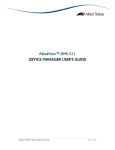
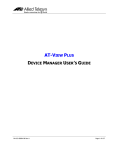
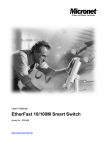
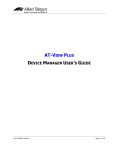



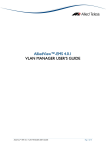

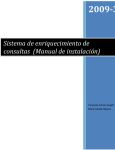
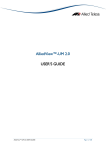
![Installation Guide: AT-TQ2450 [Rev A] (PDF Version)](http://vs1.manualzilla.com/store/data/005654085_1-f326a5d33793ff2ec849a19a13c1dba6-150x150.png)
